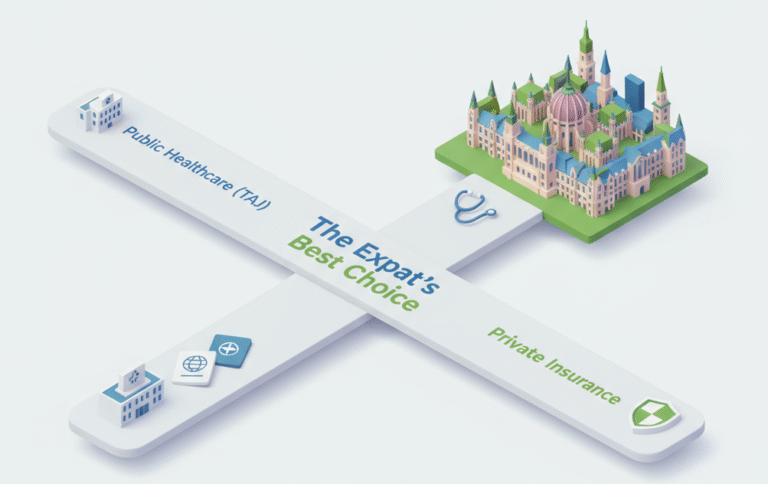Public vs. Private Healthcare in Hungary: An Expat’s Guide to Making the Right Choice
Moving to Hungary as an expat or digital nomad brings exciting opportunities—but also the daunting task of navigating a completely foreign healthcare system. You’re probably wondering: Should I rely on public healthcare in Hungary? Is private insurance worth the cost? What happens if I get seriously ill?
If you’re feeling overwhelmed by conflicting advice and bureaucratic jargon, you’re not alone. The good news? Hungary offers one of Europe’s most comprehensive healthcare systems, and with the right strategy, you can access quality care without breaking the bank.
This guide will walk you through everything you need to know about healthcare in Hungary for expats, comparing the public TAJ system with private options, and revealing why most successful expats choose a smart hybrid approach that combines the best of both worlds.
Understanding Hungary’s Dual Healthcare System
Hungary operates a two-tiered healthcare system that gives residents multiple pathways to medical care:
The Public System (TAJ/NEAK): A comprehensive, government-funded system that covers all legal residents through the National Health Insurance Fund (NEAK). Access is provided via the TAJ card, which serves as your healthcare ID.
The Private System: A rapidly growing network of private clinics and hospitals offering faster service, modern facilities, and English-speaking staff—for a price.
The Hybrid Model: The strategy most expats eventually adopt—maintaining TAJ coverage for legal compliance and major medical expenses while using private insurance for day-to-day healthcare needs.
Understanding these three options is crucial because your choice will impact not just your health outcomes, but also your finances, comfort level, and overall quality of life in Hungary.
The Public Healthcare System (TAJ/NEAK): Your Safety Net
Who Qualifies for the TAJ Card Hungary System?
The TAJ card Hungary system is more accessible than many expats realize. Here’s exactly who qualifies:
If you’re employed: All employees with valid Hungarian employment contracts are automatically enrolled, regardless of nationality. Your employer handles the paperwork, and contributions are deducted from your salary.
If you’re self-employed: This includes digital nomads using the popular KATA (flat-rate tax) system or traditional entrepreneurs. You must register with NEAK and pay contributions based on your declared income.
If you’re an EU/EEA/Swiss citizen: Short-term visitors can use their European Health Insurance Card (EHIC) for emergencies. Long-term residents can apply for a TAJ card and pay a monthly flat-rate contribution if not employed.
If you’re a non-EU citizen: Employment automatically qualifies you. Without employment, you need legal residency status and must pay the monthly flat-rate contribution.
Students and special cases: Scholarship holders (like Stipendium Hungaricum recipients) get automatic coverage. Self-funded students need at least one year of residence and must pay the flat-rate contribution for healthcare in Hungary.
The Real Cost of Public Healthcare Hungary
The cost of healthcare in Hungary through the public system is remarkably affordable:
Hidden costs: Minimal—most standard services are free at point of use, though some medications and non-essential services may require co-payments
Employed workers: Contributions are automatically deducted—no additional payments required
Self-employed individuals: Pay based on declared income with legal minimums
Non-employed residents: Pay 11,300 HUF monthly (approximately €28) as of 2024
What’s Actually Covered by the NEAK Health System?
The NEAK health system provides comprehensive coverage including:
Fully covered services:
- GP visits and primary care
- Specialist consultations (with referral)
- Hospital stays and surgeries
- Emergency care and ambulance services
- Maternity and pediatric care
- Prescription medications (partial or full reimbursement for approved drugs)
- Basic rehabilitation and long-term care
- Psychiatric and addiction treatment (with some limitations)
Not covered or limited:
Non-emergency medical transport
Routine adult dental care (except emergencies)
Elective cosmetic procedures
Private hospital rooms and amenities
Alternative medicine treatments
Premium hearing aids and vision correction
Most fertility treatments
The Reality Check: Wait Times and Quality
Here’s what you need to know about actually using public healthcare Hungary:
Wait times vary dramatically:
- Emergency care: Prompt and prioritized
- GP appointments: Usually available within days
- Specialist appointments: Often weeks to months for non-urgent cases
- Elective surgeries: Several months is common
Quality depends on location:
Language barrier: English-speaking doctors are rare outside major urban centers
Budapest central hospitals: Modern equipment, higher staff levels
Rural clinics: Often underfunded with outdated infrastructure

Step-by-Step: Getting Your TAJ Card
Choose a local GP (házi orvos) for primary care and referrals
Confirm your eligibility based on employment or residency status
Gather required documents: passport/ID, residence permit, employment proof, completed application
Apply at a Kormányablak office or through your employer/university
Register with NEAK (automatic for employees, direct for others)
Set up payment method for contributions if applicable
The Private Healthcare Revolution: Speed, Comfort, and English
Major Players in Private Health Insurance Hungary
The private health insurance Hungary market has exploded with options tailored for international residents:
Leading providers:
- TritonLife Group: Comprehensive inpatient/outpatient services with modern facilities
- FirstMed Centers: Expat-focused with extensive English-speaking staff
- Affidea Hungary: Specializes in diagnostic imaging and outpatient care
- Dr. Rose Private Hospital: Premium services including maternity and surgery
- Swiss Medical Center: Full-service care with preventive medicine focus
Most providers concentrate in Budapest, though networks are expanding to other major cities.
The True Cost of Going Private
Insurance premiums for individuals:
- Basic plans: €20-€50 monthly for young, healthy adults
- Comprehensive coverage: €100-€200+ monthly, especially for older adults or those with pre-existing conditions
- Annual clinic packages: €375-€1,250 for outpatient-only coverage
Out-of-pocket costs without insurance:
- GP visit: HUF 10,000–20,000 (€25–€50)
- Specialist: HUF 15,000–35,000 (€40–€90)
- Diagnostics: HUF 10,000–40,000 (€25–€100)
- MRI/CT: HUF 40,000–100,000 (€100–€250)
- Minor surgery: HUF 30,000–100,000 (€75–€250)
- Dental cleaning: HUF 10,000–20,000 (€25–€50)
- Private hospital room: HUF 50,000–150,000/night (€125–€375)
What Private Insurance Actually Covers
Standard inclusions in most plans:
- Direct specialist access (no referral required)
- Modern diagnostic equipment and imaging
- English-speaking, multilingual medical staff
- Short wait times and flexible scheduling
- Preventive care and annual health screenings
- Some dental and optical coverage (higher-tier plans)
- Telemedicine options
Common exclusions and limitations:
- Major surgeries and hospitalization (often excluded in local plans)
- Pre-existing conditions (waiting periods or exclusions apply)
- Chronic disease management (limited coverage)
- Maternity and fertility treatments (premium plans only)
- Out-of-network care (limited reimbursement)
The Premium Experience: Why Expats Choose Private
The difference in patient experience is substantial:
- Facilities: Modern, comfortable environments with state-of-the-art equipment
- Service: Shorter waits, longer consultations, customer service focus
- Communication: English fluency among staff, especially in Budapest
- Convenience: Online booking, digital records, streamlined administration

The Smart Expat Strategy: The Hybrid Model
Why Most Expats Choose TAJ Plus Private Insurance
The hybrid approach combining public coverage with expat health insurance Budapest options has become the gold standard for good reason:
Financial efficiency: Use TAJ for major medical expenses and emergencies while private insurance handles routine care and convenience services.
Comprehensive coverage: Eliminates gaps that exist in either system alone—you get the security of public healthcare with the comfort of private care.
Speed and quality: Access fast, English-speaking care for daily needs while maintaining backup coverage for serious conditions.
Legal compliance: Satisfies Hungary’s healthcare requirements while optimizing your actual healthcare experience.
How the Hybrid Model Works in Practice
Use TAJ/NEAK for:
- Emergency room visits and ambulance services
- Major surgeries and hospital stays
- Subsidized prescription medications
- Catastrophic or chronic illness management
Use private insurance for:
- Routine check-ups and preventive care
- Specialist consultations without referrals
- Diagnostic tests and imaging
- Dental and optical care
- Mental health services
Your Complete Action Plan: First Steps in Hungary
Week 1-2: Legal Foundations
- Register your Hungarian address at the local government office
- Obtain your residence permit or address card (depending on nationality)
- Apply for your TAJ number at a Kormányablak office or through your employer
- Set up NAV (tax authority) registration if self-employed
Month 1: Healthcare Setup
- Receive and activate your TAJ card
- Register with a local GP in your neighborhood
- Research private insurance options based on your specific needs and budget
- Purchase private health insurance that complements your TAJ coverage
- Download relevant health apps and create online accounts for your providers
Ongoing: System Optimization
- Schedule annual check-ups with both public and private providers
- Keep both insurance cards accessible and understand when to use each
- Build relationships with English-speaking doctors in both systems
Decision-Making Matrix: Finding Your Perfect Match
Quick Reference: Public vs. Private vs. Hybrid
| Aspect | Public (TAJ/NEAK) | Private Insurance | Hybrid Model |
| Monthly Cost | €0-€28 | €20-€200+ | €20-€230+ |
| Wait Times | Weeks-months for specialists | Days-weeks | Fast for routine, backup for emergencies |
| Language | Primarily Hungarian | English available | English (private) + backup |
| Coverage Scope | Comprehensive with gaps | Variable by plan | Most comprehensive |
| Quality | Variable by location | Consistently high | High with security backup |
What’s Right for You?
| Scenario | Recommended Path |
| EU employee on local contract | TAJ + basic private insurance |
| Self-employed digital nomad | TAJ (flat-rate) + private insurance |
| Retired non-EU with chronic condition | TAJ + comprehensive international insurance |
| Scholarship student | TAJ + optional student private plan |
| Relocating family | TAJ for legal/emergency + private for pediatric/specialist care |
| Short-term EU visitor | EHIC + optional private insurance |
| Short-term non-EU visitor | Comprehensive travel insurance |
If-Then Scenarios: Your Personal Roadmap
If you’re a young, healthy EU employee on a local contract: Get TAJ coverage through your employer automatically. Consider basic private insurance (€20-€50/month) for faster access to English-speaking care and routine services.
If you’re a self-employed digital nomad: Register for KATA status, obtain TAJ coverage, and invest in comprehensive private insurance (€50-€100/month) to ensure quick access to care without language barriers.
If you’re a family relocating to Hungary: Secure TAJ coverage for all family members as dependents. Private family plans (€100-€200/month) provide pediatric specialists, faster appointments, and English-speaking staff for children’s care.
If you’re a retiree with chronic conditions: TAJ coverage is essential for long-term chronic disease management and hospitalization. Supplement with international private insurance that covers pre-existing conditions.
If you’re a short-term expat (1-2 years): EU citizens can use EHIC initially, then get TAJ for legal compliance. Focus budget on comprehensive private insurance for convenience and quality of life.
If you’re a student: Scholarship holders get automatic TAJ coverage. Self-funded students should get TAJ plus basic private insurance for English-speaking care and faster service.

Making Your Final Decision: Key Considerations
Budget Planning
Minimum viable approach: TAJ only (€0-€28/month) – suitable for healthy individuals comfortable with Hungarian language and longer wait times.
Recommended approach: TAJ + basic private insurance (€20-€80/month) – ideal for most expats seeking balanced cost and convenience.
Premium approach: TAJ + comprehensive private insurance (€100-€200+/month) – best for families, older adults, or those prioritizing immediate access to high-quality care.
Risk Assessment
Consider your personal risk factors:
- Health status: Chronic conditions favor comprehensive coverage
- Language comfort: Limited Hungarian skills favor private options
- Location: Rural areas have fewer private options
- Career demands: High-pressure jobs benefit from fast, convenient care
Long-term Strategy
Your healthcare needs will evolve. The hybrid model offers flexibility to adjust coverage as circumstances change, whether that’s starting a family, developing health conditions, or changing employment status.
Frequently Asked Questions
Q: Can I use my European Health Insurance Card (EHIC) long-term in Hungary?
A: No. EHIC is only for temporary visits and emergencies. Long-term residents must obtain TAJ coverage or risk significant out-of-pocket expenses.
Q: What happens in a medical emergency if I only have private insurance?
A: Hungarian law requires emergency services to treat everyone regardless of insurance status. However, having TAJ ensures you won’t face unexpected bills for emergency care and ambulance services.
Q: Are pre-existing conditions covered under Hungarian healthcare?
A: TAJ/NEAK covers pre-existing conditions without discrimination. Private insurance often has waiting periods or exclusions for pre-existing conditions—read policies carefully.
Q: How quickly can I get specialist care with private insurance?
A: Most private providers can schedule specialist appointments within days to weeks, compared to months in the public system for non-urgent cases.
Q: Do I need to pay for prescriptions with TAJ coverage?
A: TAJ covers many medications partially or fully. You’ll pay reduced co-payments for most prescription drugs on the NEAK approved list.
Q: Can I switch between private insurance providers easily?
A: Yes, but consider waiting periods for new coverage and ensure continuous coverage to avoid gaps in care.
Q: What’s the best health insurance for expats in Hungary?
A: This depends on your specific needs, but FirstMed Centers and TritonLife Group are popular among expats for their English-speaking staff and expat-focused services. The “best” option combines TAJ coverage with private insurance that matches your budget and healthcare priorities.
Q: How do I apply for a TAJ card?
A: Visit your local Kormányablak with required documents. Your employer or university may assist. Check the Relocation Checklist
Your Path Forward: Confidence in Hungarian Healthcare
Navigating Hungary’s healthcare system doesn’t have to be overwhelming. By understanding your options and choosing the right combination of public and private coverage, you can access quality healthcare while protecting your financial security.
The hybrid model—combining TAJ’s comprehensive coverage with private insurance’s convenience—offers the best of both worlds for most expats. Furthermore, you’ll have legal compliance, financial protection for major medical issues, and the speed and comfort of private care for daily healthcare needs.
Remember, your healthcare strategy can evolve as your circumstances change. Start with the approach that fits your current situation and budget, then adjust as needed. With proper planning and coverage, you can focus on enjoying your Hungarian adventure with peace of mind about your health and wellbeing.
For the most current information and to verify your specific eligibility requirements, always consult official Hungarian government sources like NEAK (www.neak.gov.hu) and your embassy’s health advisories. Your health is worth the investment in understanding and optimizing your coverage options.
Share with your Friends:

